“Philosophers are athletes of conceptual categories,” writes Peter Sloterdijk. If so, Sloterdijk is a notable color commentator of the games. He portrays Wittgenstein as “a thinker who left behind a work of individual sentences,” a remark that illustrates Sloterdijk’s similar talent for compression, leaping thought and daring statement.
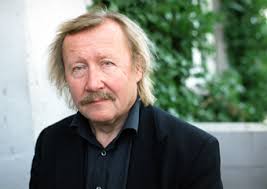 For nearly four decades, Sloterdijk (b. 1947 in Karlsruhe, Germany, his father was Dutch) has been one of Europe’s most engaging and widely discussed public intellectuals. In the wake of discourse theory and deconstruction, he has come ashore in a different place than many of his colleagues. Deeply marked by the upheavals of the 1960’s, he has not settled for cool detachments and trendy critiques. The old enigmas provoke him; his crises of meaning are perennial. But his influences are eclectic and his prime ideas promote radical creativities pitted against “resentful” ideologies (starting with Christianity).
For nearly four decades, Sloterdijk (b. 1947 in Karlsruhe, Germany, his father was Dutch) has been one of Europe’s most engaging and widely discussed public intellectuals. In the wake of discourse theory and deconstruction, he has come ashore in a different place than many of his colleagues. Deeply marked by the upheavals of the 1960’s, he has not settled for cool detachments and trendy critiques. The old enigmas provoke him; his crises of meaning are perennial. But his influences are eclectic and his prime ideas promote radical creativities pitted against “resentful” ideologies (starting with Christianity).
Sloterdijk earned his doctorate in German literature in 1975, then went to India to study under the spiritual guru Shree Rajneesh (Osho). He springs from Sartre’s “restless absurd being [who] plunges ever more deeply into his absurdity” – but he finds in creativity the assembly of symbols, images, meanings and customs that inspire action in the presence of nihilism. Intuitive reach, incisiveness, simmering pique, and deftness with imagery power his writing. He refuses to fold under deconstruction’s dictum that “we always fail in attempts to impose the full presence of meaning on what is said, [where] language is understood as a medium of lack and distortion … of settling claims and therapy.” He prefers “vectors of affirmations and prophecies,” but not of the conventional sort.
Two new books for Anglophone readers provide entries to Sloterdijk’s essential notions and energetic prose. In Nietzsche Apostle, based on a lecture he gave in 2000 on the hundredth anniversary of Nietzsche’s death, he locates the birth and “branding” of modern individualism at the moment of Thus Spoke Zarathustra. In Philosophical Temperaments, he collects his introductions to nineteen philosophers from Plato to Foucault.
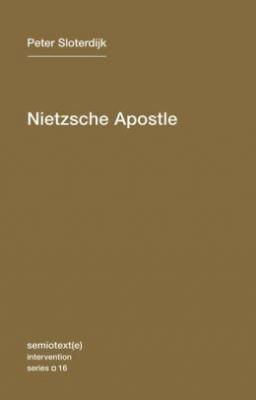 Nietzsche Apostle begins by asserting that “people are not concerned to draw each other’s attention to states of affairs, but aim instead to incorporate states of affairs into a glory … a psychosocial contest played to gain advantage for themselves … to enhance and venerate the speaker … language says one and the same thing over and again: that nothing better could have happened to the speaker than, precisely, to have been who he is … to bear witness to the merit of being in his own skin.” His argument moves swiftly from, but not without clarifying differences between, the amour-propre of the 18th century to “holy self-interest” of the 19th century (Jefferson and Emerson) to “self-design” of the present time.
Nietzsche Apostle begins by asserting that “people are not concerned to draw each other’s attention to states of affairs, but aim instead to incorporate states of affairs into a glory … a psychosocial contest played to gain advantage for themselves … to enhance and venerate the speaker … language says one and the same thing over and again: that nothing better could have happened to the speaker than, precisely, to have been who he is … to bear witness to the merit of being in his own skin.” His argument moves swiftly from, but not without clarifying differences between, the amour-propre of the 18th century to “holy self-interest” of the 19th century (Jefferson and Emerson) to “self-design” of the present time.
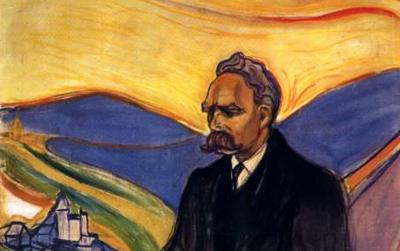 The figure of Nietzsche brings the self-venerated individual who rejoices without the scaffolding of institutional religion (“systems for maligning beings in their entirety … the abasement of the happy and of self-praising attitudes”) but who also suffers from the unveiling of the void (“bad news that cannot be compensated for”). Sloterdijk’s individual enacts “a radical abstinence with regard to traditional forms of life-serving illusions and bourgeois facilitation” that seriously adopted may lead to “unliveable disillusionment.” Nietzsche’s language mission “was to destroy the communicative competences of the venomous.”
The figure of Nietzsche brings the self-venerated individual who rejoices without the scaffolding of institutional religion (“systems for maligning beings in their entirety … the abasement of the happy and of self-praising attitudes”) but who also suffers from the unveiling of the void (“bad news that cannot be compensated for”). Sloterdijk’s individual enacts “a radical abstinence with regard to traditional forms of life-serving illusions and bourgeois facilitation” that seriously adopted may lead to “unliveable disillusionment.” Nietzsche’s language mission “was to destroy the communicative competences of the venomous.”
Nietzsche Apostle may not sound like the title of a book about and for poets and writers, but it is – specifically in tracking the modern presence, role and viability of the first-person, or the implied intelligence, in verse and literary prose. In explaining what Nietzsche intended by heaping praise on himself after completing Thus Spoke Zarathustra (“I am now, very probably, the most independent man in Europe”), Sloterdijk finds the incipience of modern individualism in the arts, a defense of “the freedom of self-enhancement against the consumerdom of the last men.”
The joy of the first men and women, the self-laudatory ones, is what one hears in Sloterdijk’s sentences, an affirmative attitude amid the swirl of the void.:
“Yes, isn’t Nietzsche thereby exactly the paradigmatic thinker of modernity insofar as it is defined by the impossibility of catching up with the real through counter-factual corrections? Is modernity not defined by a consciousness that runs ahead of the monstrousness of facts, for which discourses about art and human rights only ever consist in compensation and first aid? … Nietzsche is a teacher of generosity in the sense that he infects the recipients of his gifts with the idea of wealth, which is necessarily not worth acquiring unless with a view to being able to squander it.”
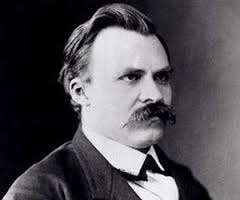 Finally, Sloterdijk shows how Nietzsche’s ideas, absorbed by mass culture, “could be found in individuals’ demands to be better and other than the rest, and thereby precisely better than all others” – and how those ideas were warped by Nazi propaganda (“fascism is nothing other than the incursion of pop- and kitsch-procedures into politics”). This is why poets often juggle two opposing impulses – first, a disavowal of heroic self-portrayal and mainstream concerns, and second, a wish to be other than the rest, to be exceptional, which inherently suggests heroic self-portrayal by more fashionable means. The “bourgeois” heroic entails values all too easily commandeered by “the consumerdom of last men” – and the wish to be elevated all too easily becomes affectation.
Finally, Sloterdijk shows how Nietzsche’s ideas, absorbed by mass culture, “could be found in individuals’ demands to be better and other than the rest, and thereby precisely better than all others” – and how those ideas were warped by Nazi propaganda (“fascism is nothing other than the incursion of pop- and kitsch-procedures into politics”). This is why poets often juggle two opposing impulses – first, a disavowal of heroic self-portrayal and mainstream concerns, and second, a wish to be other than the rest, to be exceptional, which inherently suggests heroic self-portrayal by more fashionable means. The “bourgeois” heroic entails values all too easily commandeered by “the consumerdom of last men” – and the wish to be elevated all too easily becomes affectation.
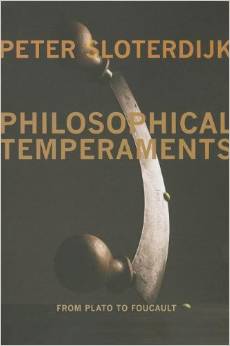 In Philosophical Temperaments, Sloterdijk considers thinkers (all male) from Plato and Augustine to Sartre and Foucault, each philosopher imagining a unifying principle that must give way to or inspire another. In his foreword, Creston Davis notes that Sloterdijk’s “methodology is developed through the psychoanalytic traditions from Freud to Lacan,” such that the philosophical gesture is not a naming of the fundamental facts of reality, but rather an encounter with “creative truths” and “the archetypes of eternal essences beyond our material existence.” But there are blockages – and usually, Sloterdijk-as-analyst senses that the unifying principles proposed by his subjects militate against more radical, creative freedoms.
In Philosophical Temperaments, Sloterdijk considers thinkers (all male) from Plato and Augustine to Sartre and Foucault, each philosopher imagining a unifying principle that must give way to or inspire another. In his foreword, Creston Davis notes that Sloterdijk’s “methodology is developed through the psychoanalytic traditions from Freud to Lacan,” such that the philosophical gesture is not a naming of the fundamental facts of reality, but rather an encounter with “creative truths” and “the archetypes of eternal essences beyond our material existence.” But there are blockages – and usually, Sloterdijk-as-analyst senses that the unifying principles proposed by his subjects militate against more radical, creative freedoms.
Yet Sloterdijk’s thumbnail portraits suggest intimacy with and empathy for their myth-making, the erecting of shared spaces of thought. Below, a section of his essay on Wittgenstein displays Sloterdijk’s penetrating obsession with language
 “The story of Wittgenstein’s life and thought is the passion of an intellect that sought to explain its place in the world and at its boundaries. What the contemporary world of the philosopher perceived as his rigid and demanding aura was the high tension of a man who required constant concentration on his ordering principles so as not to lose his mind. As one dwelling on the borderline of Being, the philosopher is never concerned with anything less than the block of the world as a whole, even when he merely pondering the correct use of a word in a sentence. He feels as though the world along with all its order could get lost in the space between two sentences. And so, thinking becomes for him a navigating between islands of formal clarity that lie scattered in the vastness of unclarity. … It was his unprecedented need for precision that would make him into a martyr of incoherence … He felt, more keenly than any other thinker before him, the difficulties of conjunctions or clausal linkages, and no problem preoccupied him more profoundly all his life than the impossibility of moving from the description of facts to ethical precepts.”
“The story of Wittgenstein’s life and thought is the passion of an intellect that sought to explain its place in the world and at its boundaries. What the contemporary world of the philosopher perceived as his rigid and demanding aura was the high tension of a man who required constant concentration on his ordering principles so as not to lose his mind. As one dwelling on the borderline of Being, the philosopher is never concerned with anything less than the block of the world as a whole, even when he merely pondering the correct use of a word in a sentence. He feels as though the world along with all its order could get lost in the space between two sentences. And so, thinking becomes for him a navigating between islands of formal clarity that lie scattered in the vastness of unclarity. … It was his unprecedented need for precision that would make him into a martyr of incoherence … He felt, more keenly than any other thinker before him, the difficulties of conjunctions or clausal linkages, and no problem preoccupied him more profoundly all his life than the impossibility of moving from the description of facts to ethical precepts.”
Sloterdijk is appalled and angered by the axiom “launched by Augustine and the Catholic Fathers … that he who wishes to be pleasing to God must be displeased with himself.” His mini-biographies trace the philosophical attempt over time to achieve a broad latitude of perception – while impinged by the restrictions of dogma. Throughout, Sloterdijk speaks in a way that recalls his image of Sartre: “To him, the nothingness of subjectivity was not a downward-plunging abyss, but a spring bubbling upward, an excess of the power of negation against everything that was encompassing.”
[Nietzsche Apostle, translated by Steven Corcoran. Published by Semiotext[e]/Editions Suhrkamp on December 10, 2013. 104 pages, $12.95 paperback. Philosophical Temperament, translated by Thomas Dunlap, published by Columbia University Press on May 28, 2013, 114 pages, $19.95 paperback]
On Philosophical Temperaments
Ah, the compromises thinkers have to make merely to communicate could fill a book. One might say the same for writers of our ilk. (Which sentence I just wrote in modesty, then paused to imagine the self-glorification it implied.) The end of a busy day, discarded drafts littering my mental landscape, after the foolish arguments and all my strongly held beliefs, I figure that there’s no escaping the limitations of the means we have chosen to be free. Whereas no one is to blame for that, I can’t see there’s any way we can frame anything we’re stuck inside of. The smart money, we get our mileage out of it, then we get out. Sartre’s fantasy of negation spiralling upwards in liberation I put in the same box as political idealism, wherein the various schools of thought all fight it out to the death. The only thing that remains is the bloody box. As for the first-person pronoun, the first step on the road to wisdom (I’ve heard) is the discovery that it never existed. Most else is vanity, bound to the self-heroics that pulls one ever closer away from the addressable reality. Not surprising that Sloterdijk spent that time in India. Not surprising either that he left with an addressable reality under his bonnet. Thank you for another excellent review.
Sloterdijk review
Good to see this piece on Sloterdijk, especially for those who’ve had their fill of Zizek. The latter has eclipsed all too many contemporary western thinkers with his sellable, incessant blqbbing. These two new titles sound intetesting but I do hope readers will turn back to S’s main works of the past twenty years or so. They’re rich with great notions and they show a man trying to find a way to live. Sometimes eccentric but not for craven media attention a la Z.